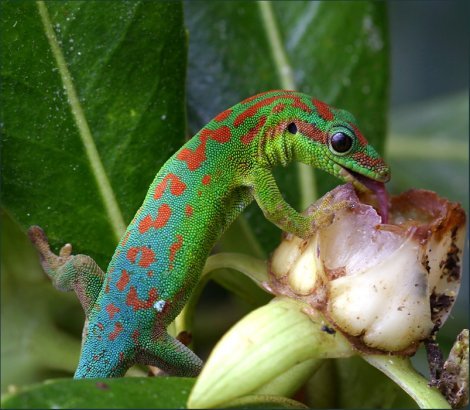 分布於印度洋的日守宮(Phelsuma)與數種植物的專一性授粉關係已經在近年來被深入地研究 (見Olesen & Valido, 2003; Hansen, 2005, Hansen et al. 2006). 然而Hansen & Müller (2008)更進一步發現入侵模里西斯的白足扁蟻對模里西斯藍尾日守宮與瀕危的盧梭木之間的專一性授粉關係造成了危害, 使著日守宮與盧梭木的生存遭受嚴重的威脅. 他們的實驗證實曾經被螞蟻攻擊掠奪蜜源的盧梭木迫使日守宮訪花率大為降低, 此外被蟻攻擊的植物因結實率低, 因此守宮對植物種子的播遷亦大為減少. 此種因外來種引入對兩種專一性動植物關係造成的危害將是保育上的一大隱憂. 另可見NewScientist對此事件的報導.
分布於印度洋的日守宮(Phelsuma)與數種植物的專一性授粉關係已經在近年來被深入地研究 (見Olesen & Valido, 2003; Hansen, 2005, Hansen et al. 2006). 然而Hansen & Müller (2008)更進一步發現入侵模里西斯的白足扁蟻對模里西斯藍尾日守宮與瀕危的盧梭木之間的專一性授粉關係造成了危害, 使著日守宮與盧梭木的生存遭受嚴重的威脅. 他們的實驗證實曾經被螞蟻攻擊掠奪蜜源的盧梭木迫使日守宮訪花率大為降低, 此外被蟻攻擊的植物因結實率低, 因此守宮對植物種子的播遷亦大為減少. 此種因外來種引入對兩種專一性動植物關係造成的危害將是保育上的一大隱憂. 另可見NewScientist對此事件的報導.Invasive Ants Disrupt Gecko Pollination and Seed Dispersal of the Endangered Plant Roussea simplex in Mauritius
Dennis M. Hansen 2,1 and Christine B. Müller 2,†
1Corresponding author; Current address: Department of Biology, Stanford University, 371 Serra Mall, Stanford, California 94305, U.S.A.; e-mail: dmhansen@stanford.edu
2Institute of Environmental Sciences, University of Zurich, Winterthurerstrasse 190, CH-8057 Zurich, Switzerland
†Deceased 7 March 2008.
ABSTRACT
In Mauritius, the endemic blue-tailed day-gecko Phelsuma cepediana is currently the sole pollinator and seed disperser of the critically endangered endemic plant Roussea simplex (Rousseaceae). The flowers and fruits are often visited by the invasive ant Technomyrmex albipes, which forages on the nectar and fruit pulp, and tends honeydew-producing mealybugs on the fruits. Here, we experimentally explore how the presence of this alien ant species influences geckos foraging at flowers and fruits of R. simplex by removing and excluding ants from flowers and fruits. Gecko visitation rates to ant-free control flowers and fruits, and flowers and fruits where ants had been removed and excluded, were higher than those to ant-infested flowers and fruits. The resulting seed set of ant-infested flowers was greatly reduced, compared to ant-free control flowers. Similarly, for fruits with ants, very few seeds were likely to be ingested and dispersed by the geckos. Thus, T. albipes monopolizes flowers and fruits of R. simplex, and prevents access of pollinating and seed-dispersing P. cepediana geckos by aggressive interference competition. For a critically endangered plant like R. simplex, this double-disruption of two vital mutualistic interactions is of urgent conservation concern.
圖片連結: http://www.spektrumdirekt.de
